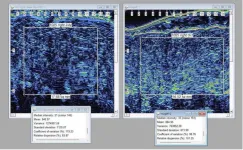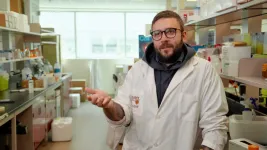Epigenetic mechanisms activated by GHK-Cu increase skin collagen density in clinical trial
2023-05-25
(Press-News.org) Skin loses collagen and elastin and becomes progressively thinner with age leading to wrinkles, so reversing this age-related loss of skin density is the holy grail of anti-aging treatments. One compound capable of doing that is the naturally occurring peptide GHK-Cu (GHK from glycyl-L-histidyl-L-lysine bound to a copper ion), which affects 31.2% of the human genes by either activating or deactivating them (based on a criterion of a reduction or increment in gene activity of more than 50%), meaning that it works by inducing epigenetic alterations in the cells.
Exploiting these properties has been limited, to date, secondary to the difficulty in achieving adequate skin penetration of the compound. Yuvan Research Inc. (a California-based longevity biotech start-up), has developed novel formulation with pharmaceutical grade excipients (aids to skin penetration) that appears to have overcome this hurdle.
A clinical study conducted by Wayne Carey, MD, Professor of Dermatology McGill University (Canada), evaluated 21 subjects utilizing this formulation for 3 months, using pre and post ultra-high resolution ultrasound imaging of the facial skin. There was an average of 28% increase in subdermal echogenic density (which correlates with collagen/elastin elements). The top quartile of participants demonstrated an average of 51% improvement in collagen over 3 months.
High resolution dermal ultrasound equipment is a state of the art imaging modality that allows the visualization of near microscopic skin elements.
Although GHK-Cu was discovered in 1973, it was only recently that biomedical technology advanced to the point where the epigenetic modulation caused by it could be identified. After the sequencing of the human genome, in the early 2000s, the Broad Institute launched in 2010 the Connectivity Map, where numerous compounds were analyzed to find out what was their influence on the expression of genes. It was then that became evident the effect that GHK-Cu had on changing the human cellular phenotype by resetting the cells to a younger and healthier state.
YUVAN RESEARCH’s novel formulation of GHK-Cu (patent protected) provides greater stability to the compound and facilitates its transdermal delivery. According to Akshay Sanghavi, CEO and co-founder of Yuvan Research, "It is very rare to see a skin care product whose efficacy is proven by an Investigational Review Board - approved human clinical trial, conducted by a world class investigator at a renowned institution.”
YUVAN’s cofounder is Dr. Harold Katcher, a leading researcher in the rejuvenation science field. "Dr. Katcher believes that we must always have the conviction of scientific evidence before making any product available.", says Sanghavi.
The discoverer of GHK-Cu, Dr. Loren Pickart, has previously highlighted system wide tissue repairs and physiologic improvements in skin, lung, liver, boney structures, and connective tissues in his research papers. Additionally, the peptide was also found to possess powerful cell-protective actions, such as anti-cancer activities and anti-inflammatory actions mediated through improved fibroblast activity and suppression of damaging inflammatory molecule production. Improved DNA repair and improved proteasome function are also other mechanisms of action.
The GHK-Cu-based gel used by Yuvan Research in the clinical trial is called "Neel" (www.Neelgel.com), which means "powerful blue" in Sanskrit, because of its natural blue color. Also, Neel gel is now available on Amazon.com and also it’s website neelgel.com.
In recent years, epigenetics has been gaining more and more relevance in the biomedical research environment by proving to be an essential determinant of human health, as well as a potential intervention mechanism. Thus, it became evident that human cells, and the organism as a whole, have intrinsic and natural repair mechanisms that, if activated, can be much more efficient than artificial therapies. GHK-Cu is one of the most powerful peptides in our body that goes down with age, and now this clinical study brings empirical evidence of improved collagen density by providing the skin with GHK-Cu in a stable and skin penetrating formulation.
Media contact:
Dharaa Suresha
Yuvan Research Inc.
dha.sur@yuvanresearch.com
END
[Attachments] See images for this press release:


ELSE PRESS RELEASES FROM THIS DATE:
2023-05-25
Attention editors: Embargoed by the journal Nature Chemical Biology until Thursday, May 25 at 11 a.m. easter
Hamilton, ON, May 25, 2023 – Scientists at McMaster University and the Massachusetts Institute of Technology have used artificial intelligence to discover a new antibiotic which could be used to fight a deadly, drug-resistant pathogen that strikes vulnerable hospital patients.
The process they used could also speed the discovery of other antibiotics to treat many other challenging ...
2023-05-25
A study led by researchers at the UCLA Jonsson Comprehensive Cancer Center has found that targeting a metabolic process in people with a specific genetic mutation could help treat glioblastoma, an aggressive brain cancer.
The genetic alteration — a deletion in a gene called CDKN2A — is present in about 60% of people who have glioblastoma. The mutation causes changes in the way lipids are distributed in cancer cells, which in turn makes the cancer cells vulnerable to being destroyed. The ...
2023-05-25
LA JOLLA, CA—A population of unconventional white blood cells has recently captured the attention of immunologists and clinicians alike. Unlike conventional T cells, which circulate throughout the body in our blood, mucosal-associated invariant T (MAIT) cells are largely found in tissues where they provide immune protection against a broad range of diseases.
MAIT cells are highly abundant in humans. Although they make up only 2 percent of the lymphocytes in blood, MAIT cells account for 10 to 40 percent of lymphocytes in the liver, and they are common in tissues such as lungs. Still, much about MAIT cell biology and clinical function remains unknown.
In ...
2023-05-25
About The Study: The findings of this study using data for 3.6 million births suggest that the Maternal Vulnerability Index (MVI), a novel county-level index designed to quantify maternal vulnerability to adverse health outcomes, was associated with preterm birth even after adjustment for individual-level confounders. The MVI is a useful measure for county-level preterm birth risk that may have policy implications for counties working to lower preterm rates and improve perinatal outcomes.
Authors: Sara C. Handley, M.D., M.S.C.E., Children’s Hospital of Philadelphia, is the corresponding author.
To ...
2023-05-25
About The Study: In this diagnostic study of 45 children with autism spectrum disorder (ASD) and 50 with typical development, a deep learning system trained on videos acquired using a joint attention–eliciting protocol for classifying ASD versus typical development and predicting ASD symptom severity showed high predictive performance. This new artificial intelligence–assisted approach based predictions on participants’ behavioral responses triggered by social cues. The findings suggest that this method may allow digital measurement of joint attention; however, follow-up studies are necessary for further validation.
Authors: Yu ...
2023-05-25
CAMBRIDGE, MA -- Using an artificial intelligence algorithm, researchers at MIT and McMaster University have identified a new antibiotic that can kill a type of bacteria that is responsible for many drug-resistant infections.
If developed for use in patients, the drug could help to combat Acinetobacter baumannii, a species of bacteria that is often found in hospitals and can lead to pneumonia, meningitis, and other serious infections. The microbe is also a leading cause of infections in wounded soldiers in Iraq and Afghanistan.
“Acinetobacter can survive on hospital doorknobs and equipment ...
2023-05-25
PORTLAND, Oregon -- New animal research is helping explain why at least five people have become HIV-free after receiving a stem cell transplant. The study’s insights may bring scientists closer to developing what they hope will become a widespread cure for the virus that causes AIDS, which has infected about 38 million people worldwide.
Published in the journal Immunity, the Oregon Health & Science University-led study describes how two nonhuman primates were cured of the monkey form of HIV after receiving a stem cell transplant. ...
2023-05-25
Since the emergence of SARS in 2002, coronaviruses have been recognized as potential pandemic threats. This emergence highlights a need for evidence-based strategies to monitor bat coronaviruses. Daniel Becker, Ph.D., a researcher at the University of Oklahoma, is collaborating with other scientists nationwide to determine directions for future research.
Becker, an OU assistant professor of biology, was the senior author of a paper published in Nature Microbiology. The study’s lead author was Lily Cohen, a medical student at the Icahn ...
2023-05-25
Long COVID, or Post-Acute Sequelae of SARS-CoV-2 infection (PASC), includes a wide range of symptoms that present or persist more than 30 days after COVID-19 infection. With over 650 million people globally having been infected with SARS-CoV-2, long COVID represents a significant public health concern that affects quality of life, earnings, and health care costs. To better understand the prevalence and severity of symptoms, the National Institutes of Health (NIH) launched Researching COVID to Enhance Recovery (RECOVER-Adult), ...
2023-05-25
About The Study: In this analysis of data from 9,764 participants in the RECOVER adult cohort, a prospective longitudinal cohort study, 37 symptoms across multiple pathophysiological domains were identified as present more often in SARS-CoV-2–infected participants at six months or more after infection compared with uninfected participants. A preliminary rule for identifying postacute sequelae of SARS-CoV-2 infection (PASC), also known as long COVID, was derived based on a composite symptom score. As a first step to providing a framework for other investigations, iterative refinement that further incorporates other clinical features is needed ...
LAST 30 PRESS RELEASES:
[Press-News.org] Epigenetic mechanisms activated by GHK-Cu increase skin collagen density in clinical trial




